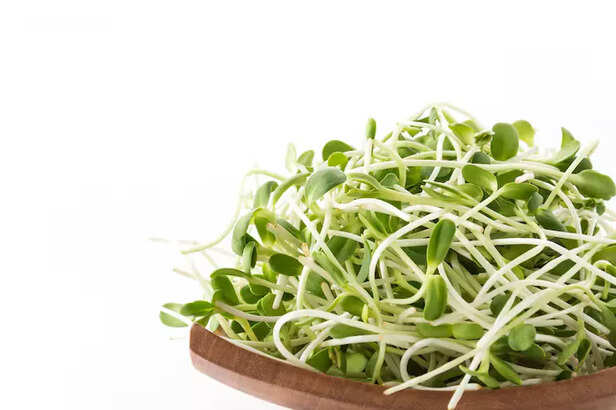Why Your High-Protein Diet Isn’t Working? Fix It Today
Amritansh Nayak | May 03, 2025, 06:30 IST

Although it's simple to make mistakes, beginning a high-protein diet can help you lose weight and gain muscle. Common errors that might jeopardize your health and goals include not drinking enough water and not paying attention to portion control. Discover the main mistakes to steer clear of and how to create a more sustainable, well-balanced diet that emphasizes protein.
Diets high in protein have gained enormous popularity as a way to increase muscle mass, reduce body weight, and enhance general fitness. Nevertheless, a lot of people adopt this eating pattern without fully comprehending how to control portion sizes or maintain nutrient balance. Although protein is necessary, an over emphasis on it may result in unanticipated health problems. Knowing what to avoid is essential, regardless of your level of experience or desire to improve your diet. We'll dissect the most typical errors people make while beginning a high-protein diet in this post.

Focusing too much on protein at the expense of other vital nutrients is one of the most frequent errors people make when beginning a high-protein diet. Many people drastically cut back on beneficial fats, fiber, and carbs in their haste to gain muscle or lose weight. Although protein is essential for metabolism, satiety, and muscle repair, it cannot work at its best on its own. Whole grains, fruits, and vegetables are examples of healthy carbs that provide the body energy, facilitate digestion, and promote brain function. In the meanwhile, regular bowel movements, gut health, and lowering the risk of chronic diseases all depend on dietary fiber.
Heart health, vitamin absorption, and hormone production are all significantly impacted by good fats, which may be found in foods like avocados, nuts, seeds, and olive oil. Fatigue, constipation, vitamin deficits, and even long-term health problems might result from ignoring these nutrients. A range of nutrient-dense whole foods should still be a part of a well-balanced high-protein diet. Focus on making better decisions and portion sizes rather than cutting out carbohydrates and fats. Building a sustainable eating pattern that promotes your general health, not simply your protein consumption, is the aim.

Many people prioritize quantity over quality when beginning a high-protein diet, which might backfire. Not every source of protein is made equally. High-sodium protein bars and processed deli meats are not nutritionally comparable to lean chicken breast and grilled salmon. You can increase your consumption of harmful fats, sodium, and chemical preservatives by relying too much on processed meats like bacon or sausages or low-quality protein powders loaded with artificial additives. These foods are all connected to long-term health hazards like cancer and heart disease. High-quality, nutrient-dense protein sources should be given priority instead.
These consist of omega-3 fatty acid-rich fish like salmon and sardines, as well as lean meats like skinless chicken and grass-fed cattle. Along with fiber, vitamins, and minerals, plant-based proteins such as eggs, beans, lentils, tofu, and tempeh also provide great nourishment. Choose trustworthy, clean products with few ingredients and third-party testing, even when it comes to protein supplements. Your diet should be built around whole foods, with supplements to fill in the gaps sometimes, not to take the place of meals. You may more efficiently and sustainably boost energy levels, muscular growth, and general health by selecting your protein sources carefully.

Not drinking enough water is one of the most overlooked yet crucial errors people make when following a high-protein diet. Nitrogen is a waste product produced by the body when protein breaks down. Urine is the result of the kidneys filtering out this nitrogen. This metabolic waste is increased by a higher protein diet, placing additional strain on the kidneys, which require optimum water to function. Dehydration, kidney strain, and in certain situations, kidney stones, can result from not increasing water consumption to keep up with the increased protein load. Constipation, headaches, dark urine, and exhaustion are typical indicators that you're not drinking enough water when following a high-protein diet.
Drink 8 to 10 cups of water a day, or more if you're exercising or eating a lot of protein, to ensure you're staying properly hydrated. Keeping an eye on the color of your urine is a good idea; pale yellow typically denotes proper hydration. Don't put off drinking water until you're thirsty. When following a high-protein diet, make it a practice to stay hydrated throughout the day to support renal function, digestion, and general health.

When beginning a high-protein diet, people frequently mistakenly believe that they can consume protein-rich foods indefinitely without suffering any negative effects. Protein still has calories—roughly 4 calories per gram—even though it aids in muscle upkeep and satiety. Even consuming too much of a healthy protein source, such as Greek yoghurt, chicken, eggs, or almonds, can result in a surplus of calories, which eventually causes weight gain instead of fat loss. Goals for weight loss or fitness can be readily undermined by the "more is better" mentality. For instance, indulging in protein smoothies or aimlessly munching on handfuls of nuts may seem like healthy habits, but they soon build up in calories.
In the same way, eating a lot of meat or cheese at every meal can throw your diet out of balance and increase your intake of saturated fat. As with any other eating plan, controlling portion sizes is crucial when following a high-protein diet. Remember to incorporate a balance of veggies, whole grains, and healthy fats in your diet, and track your intake with tools like food scales or calorie-tracking apps. Your high-protein strategy will assist your general health and specific goals, such as weight loss, muscle building, or increased energy, if you prioritize nutrient-dense meals over mere quantity.
When followed properly, a high-protein diet can be a very effective tool for improving health. Despite your best efforts, neglecting important aspects like as protein quality, portion sizes, hydration, and dietary diversity might have unintended repercussions. The secret is balance: eat complete meals, keep an eye on how much you consume, and drink enough water. You'll have a far higher chance of reaching your long-term health, weight, and energy objectives if you steer clear of these typical blunders. Choose a more intelligent approach to high-protein living and avoid letting false information or hasty judgements ruin your development.
Explore the latest trends and tips in Health & Fitness, Travel, Life Hacks, Fashion & Beauty, and Relationships at Times Life!

protein sources
Consuming Too Much Protein and Ignoring Other Nutrients
Heart health, vitamin absorption, and hormone production are all significantly impacted by good fats, which may be found in foods like avocados, nuts, seeds, and olive oil. Fatigue, constipation, vitamin deficits, and even long-term health problems might result from ignoring these nutrients. A range of nutrient-dense whole foods should still be a part of a well-balanced high-protein diet. Focus on making better decisions and portion sizes rather than cutting out carbohydrates and fats. Building a sustainable eating pattern that promotes your general health, not simply your protein consumption, is the aim.

balanced nutrition
Disregarding Protein Source Quality
These consist of omega-3 fatty acid-rich fish like salmon and sardines, as well as lean meats like skinless chicken and grass-fed cattle. Along with fiber, vitamins, and minerals, plant-based proteins such as eggs, beans, lentils, tofu, and tempeh also provide great nourishment. Choose trustworthy, clean products with few ingredients and third-party testing, even when it comes to protein supplements. Your diet should be built around whole foods, with supplements to fill in the gaps sometimes, not to take the place of meals. You may more efficiently and sustainably boost energy levels, muscular growth, and general health by selecting your protein sources carefully.

hydration on high protein diet
Not Getting Enough Water
Drink 8 to 10 cups of water a day, or more if you're exercising or eating a lot of protein, to ensure you're staying properly hydrated. Keeping an eye on the color of your urine is a good idea; pale yellow typically denotes proper hydration. Don't put off drinking water until you're thirsty. When following a high-protein diet, make it a practice to stay hydrated throughout the day to support renal function, digestion, and general health.

healthy protein sources
Ignoring Calorie Awareness and Portion Control
In the same way, eating a lot of meat or cheese at every meal can throw your diet out of balance and increase your intake of saturated fat. As with any other eating plan, controlling portion sizes is crucial when following a high-protein diet. Remember to incorporate a balance of veggies, whole grains, and healthy fats in your diet, and track your intake with tools like food scales or calorie-tracking apps. Your high-protein strategy will assist your general health and specific goals, such as weight loss, muscle building, or increased energy, if you prioritize nutrient-dense meals over mere quantity.
When followed properly, a high-protein diet can be a very effective tool for improving health. Despite your best efforts, neglecting important aspects like as protein quality, portion sizes, hydration, and dietary diversity might have unintended repercussions. The secret is balance: eat complete meals, keep an eye on how much you consume, and drink enough water. You'll have a far higher chance of reaching your long-term health, weight, and energy objectives if you steer clear of these typical blunders. Choose a more intelligent approach to high-protein living and avoid letting false information or hasty judgements ruin your development.
Explore the latest trends and tips in Health & Fitness, Travel, Life Hacks, Fashion & Beauty, and Relationships at Times Life!
